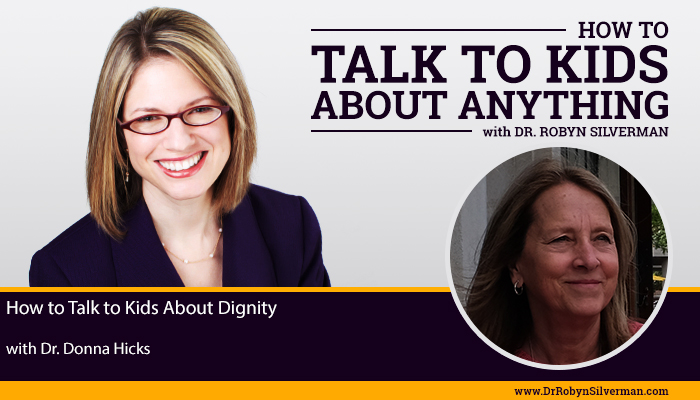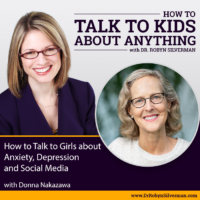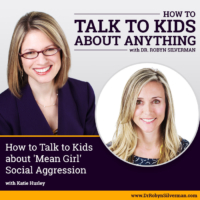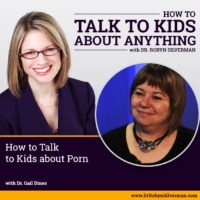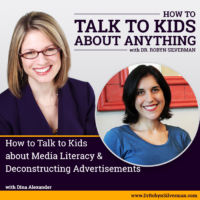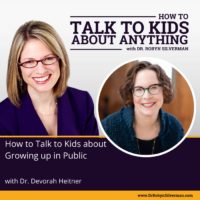Podcast: Play in new window | Download
Subscribe: Apple Podcasts | RSS | More
How to Talk to Kids about Dignity
This podcast will focus on how to talk to kids about dignity. Dignity is all about treating others like they matter—everyone has value. In this podcast, Dr. Robyn Silverman and Donna Hicks discuss the difference between dignity and respect, how dignity relates to school hierarchies and friendships, the 10 elements of dignity and how to avoid being “baited” to violate someone’s dignity. We also discuss tips, activities and scripts to help parents and educators talk with children about dignity so they can be aware of it and use the lessons in their lives. Finally, we discuss how dignity relates to leaderships and how to grow leaders who treat others with dignity.
As we discuss conversations on this podcast— key conversations we must have with our children about tough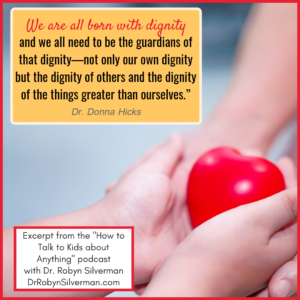 topics— sex, death, divorce, porn, failure, ADHD, bullying— discussions where emotions can run high, agendas can cloud openness and listening and true presence— fear can make us shy away from saying what truly needs to be said, or heard or understood. What if there was a step that we needed to take before we had these all important conversations— a step that acknowledged the importance of dignity for each person— to hold another person’s dignity as precious and valuable while also knowing that our own would be kept in tact as well. How might that affect these key conversations we have with our partners, with our children, with teachers, instructors, coaches— people who touch our lives and help to shape how they evolve. And what if we focused on dignity as a fundamental part of raising our children to become leaders— showing and discussing how we can lead with dignity and create a culture that brings out the best in people? For these questions and more, we turn to our distinguished guest, Dr. Donna Hicks.
topics— sex, death, divorce, porn, failure, ADHD, bullying— discussions where emotions can run high, agendas can cloud openness and listening and true presence— fear can make us shy away from saying what truly needs to be said, or heard or understood. What if there was a step that we needed to take before we had these all important conversations— a step that acknowledged the importance of dignity for each person— to hold another person’s dignity as precious and valuable while also knowing that our own would be kept in tact as well. How might that affect these key conversations we have with our partners, with our children, with teachers, instructors, coaches— people who touch our lives and help to shape how they evolve. And what if we focused on dignity as a fundamental part of raising our children to become leaders— showing and discussing how we can lead with dignity and create a culture that brings out the best in people? For these questions and more, we turn to our distinguished guest, Dr. Donna Hicks.
Dr. Donna Hicks is an Associate at the Weatherhead Center for International Affairs at Harvard University. She facilitated dialogues in numerous unofficial diplomatic efforts in the Middle East, Sri Lanka, Cambodia, Colombia, Cuba, Libya and Syria. She was a consultant to the BBC in Northern Ireland where she co-facilitated a television series, Facing the Truth, with Archbishop Desmond Tutu. She has taught courses in conflict resolution at Harvard, Clark, and Columbia Universities and conducts trainings seminars in the US and abroad on dignity leadership training and on the role dignity plays in resolving conflict. She consults to corporations, schools, churches, and non-governmental organizations. Her book, Dignity: It’s Essential Role in Resolving Conflict, was published by Yale University Press in 2011. Her second book, Leading with Dignity: How to Create a Culture That Brings Out the Best in People, was published by Yale University Press in August 2018.
The podcast provides:
- How dignity and respect differ
- How dignity relates to school hierarchies and friendships
- The 10 elements of dignity
- How to avoid being “baited” to violate someone’s dignity.
- Tips, activities and scripts to help parents and educators talk with children about dignity
- How dignity relates to leadership
- How to grow leaders who treat others with dignity.
Important Messages:
- Many people don’t talk about dignity. If we are going to make progress in our relationships, we need to
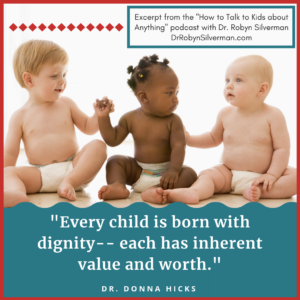 address these emotional hurricanes or tsunamis.
address these emotional hurricanes or tsunamis. - People are more willing to talk about “dignity” than “emotions.”
- We are born with dignity. We must earn respect. You can’t demand respect but you can demand dignity.
- We are all born with dignity, we are all equal in dignity.
- We can’t deny that there are hierarchies. But we are still all equal in dignity. Whether you are working as a teacher with a child or a boss working with an employee, everyone is worthy of being treated with dignity.
- Dignity training for 3rd graders—kids know when people are or not treated with dignity. They understand that even though their teachers have power over them, they need to be help accountable for being treated with dignity.
- “Tell me about a time when you feel your dignity was honored and what did that feel like?” is a great question to ask about dignity.
- What’s part of dignity?
- People want to be accepted.
- People want acknowledgement for the suffering they endured.
- People want to feel safe- this is part of dignity. They want to be able to speak up and it to be safe. In business- 80% of the people Donna interviewed said the key thing that was violated most often was “safety.” They didn’t feel it was safe to speak up when someone violated their dignity- especially when their boss/leaders treted them poorly.
- People want to be treated fairly.
- They want to feel independent.
- And understanding is another part of dignity as well. They want to talk about their perspective. They don’t want to be stereotyped.
- They want the benefit of the doubt.
- Accountability. They want apologies and they want people to commit to not doing it again.
- We can DO something to avoid violating someone’s dignity.
- Our mental world is preprogrammed. We are not a blank slate. We have reactions. We have certain behaviors under threat.
- Violations: Revenge, shame/blame, saving face
- The truth always prevails.
- We want dignity consciousness.
- Teachers and parents need a really strong working knowledge of what dignity is—what it feels like, what it looks like. What is it like to come home after having your dignity violated?
- Dignity is a way to address bullying. What are we up against? This is mental harm. Harm to their inner world. This is real to kids.
- Allow the kids to take the dignity tasks and translate them into “kid language” and make them “kid friendly.”
- Let people tell their story- “when have you felt your dignity was being violated?” Then after they tell you- “how would you want to have been treated.”
- Once you embrace dignity, you awaken to joy.”
Notable Quotables:
- “There’s a legitimizing effect when you say; ‘I’m upset because my dignity has been violated.’ That’s validating for people and
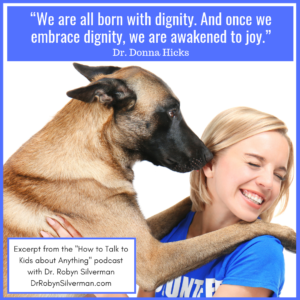 they want to tell those stories.”
they want to tell those stories.” - “Dignity is something that everyone is born with because dignity is means everyone has inherent value and worth. On the other hand, respect is something that is earned.”
- “We may differ in status but we are all equal in dignity.”
- “People want to be accepted, no matter who they are—their race, their religion, their ethnicity, their sexual orientation, people want to be treated as if they are worthy no matter what their identity.”
- “Dignity violations are common sense but not common knowledge.”
- “When someone violates our dignity, we want revenge and we want to get even. But if you take the bait and return the harm, you’re going to let someone else’s bad behavior determine how you’re going to act. We don’t want that. That’s not a dignity leader–that’s a dignity violator. We want to learn how to restrain ourselves because otherwise it creates a vicious cycle of indignities—a downward spiral.”
- “The truth is the only casualty with instant impulses and reactions.”
- “We don’t want kids to only avoid dignity violations, we want them to know how to honor the dignity in others too.”
- “Everybody matters.”
- “We all know how we want to be treated.”
- “Dignity matters.”
- “Once we embrace dignity, we are awakened to joy.”
- We are all born with dignity and we all need to be the guardians of that dignity—not only our own dignity but the dignity of others and the dignity of the things greater than ourselves.”

